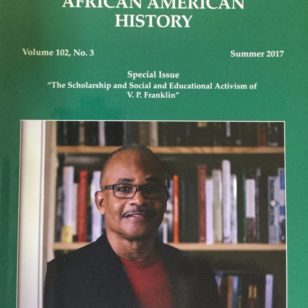Let a Strategy from Our Past Be Our Future
In the 1930s, when the foundations that had been assisting Carter G. Woodson and the Association closed their purses, Carter G. Woodson turned directly to the community to support our efforts to get black history before the community. Over the last four decades, ASALH has sold its journals to university and colleges, and while we did not get rich, we were satisfied enough with the revenue and now it dries up. The University of Chicago contract is at best a temporary solution, because they have no means of increasing sales of product that the academy can no longer afford. By staying an independent publisher, ASALH can look to the community, especially our branches, to sustain our publishing program and get our journals to teachers and students.
As the academic market for new scholarship continues to decline, JSTOR has just launched a new program that will allow to remain an independent publisher and increase our subscriber base and revenue by teaming with our branches and community organizations across the nation. Working with them, we can get the digital Journal of African American History, Black History Bulletin and Fire!!! before students, teachers, and community members. More than ever, Woodson’s journals will be in the hands of schools and civic organizations such as museums, community organizations, and public libraries.
Prior to now, we could not combine our new digital files and our century worth of back files into a single product. We could not even bundle them together because they were on different delivery platforms. But with the JSTOR New Journals Program, we now can do so. We can price the entire run of the Journal of African American History—over a century—and make them available to entire local school districts, local libraries, and museums. We can get a grant to digitize and make available the entire run of the Black History Bulletin as well.
How would this unprecedented access to the community be paid for? By relatively minor donations from local corporations raised by ASALH’s branches and other civic groups in our community. Organizations such as the Links, the Prince Hall Masons, and the Greek Letter organizations can help. They also understand that increasingly backwards voices in America are retreating from teaching the truth about slavery and Jim Crow. They know our children are not learning about themselves and their ancestors’ accomplishments in the curriculum. They know culturally inclusive education may be the goal of teachers but not the priority of those who control the budgets. We can stop the movement backwards and increase our subscriber database and revenue by making our publishing program more in keeping with our original mission—to spread the truth about our past.
The Structure of the New Program
- Local or regional corporations will be asked to donate approximately $2,000 to $2,5000 to the branch or civic organizations.
- $500 of these funds will be used to buy a bundle subscription to the Black History Bulletin, the Journal of African American History, and Fire!!! respectively.
- The remainder of the funds would be retained by the branch or civic organization to promote and sustain the program and other activites.
- This will help build and promote our branches
- It will expand our number of partners nationwide.
- The local corporate sponsors would affirm the values we share with them
- The importance of knowledge in a democratic society
- The centrality of diversity to our country’s progress
- That corporations must be good citizens of the community
- ASALH will increase its revenues and its reach into the community
- The subscription would take care of the $15 fee from JSTOR who would deliver the digital journal to the institutions in the same manner they currently do schools and colleges.
- ASALH will be able to extend its subscriber base beyond where we have been since the late 1960s—when the journal were in local schools and public libraries before budgets were cut.
The New Self-Publishing Program versus the Chicago Proposal
While this program is not wholly conceivable with the University of Chicago Press.
- They carry only one of our journals, so logistically it is much more cumbersome and expensive. We would have to run dual staffing.
- Because they would be our publisher, they would claim a 50% chunk of the revenue that is assigned to JAAH. Indeed, they might even want as much as $200 of every bundle. Yes, they would be owed this money even though we would have published more than 98% or more of it without them.
By staying with JSTOR and taking advantage of their New Journal Program, we will enjoy the following benefits.
- JSTOR picks up the Black History Bulletin. This is itself a major advantage of the program, placing both of our journals on the same platform.
- The BHB, Fire!!!, and JAAH will all be on the same platform—for the first time ever!
- JSTOR reduces its fees on the hosting of new scholarship from 25% to $15 a customer, which on a $350 subscription is less than 4.2 percent.
- In comparison with Chicago, it is a no brainer. Chicago’s 50% split on a $350 subscription would cost us $175.00 versus $15.00 with JSTOR.
The only other cost with JSTOR is a platform fee of $2,000 for each journal, which is the price of a high traffic, managed website. One with IP address authentication, a necessary component, is thousands of dollars more.
A New Revenue Stream Made Possible by Self-Publishing
ASALH has been looking for a new revenue stream and this is it. Rather than having come up with a new publication or a new national sponsor, we can take advantage of creating a new product from our existing publications! We can build on our existing expertise and our treasure of black history.
If we are able to get a hundred new institutional subscribers for both the Black History Bulletin, the Journal of African American History, and Fire!!! This bundle of new subscriptions would bring in $50,000 in revenue. The cost against this would be $4,500. With the University of Chicago Press, the cost against the JAAH share it would be $25,000 or more and entail negotiations.




